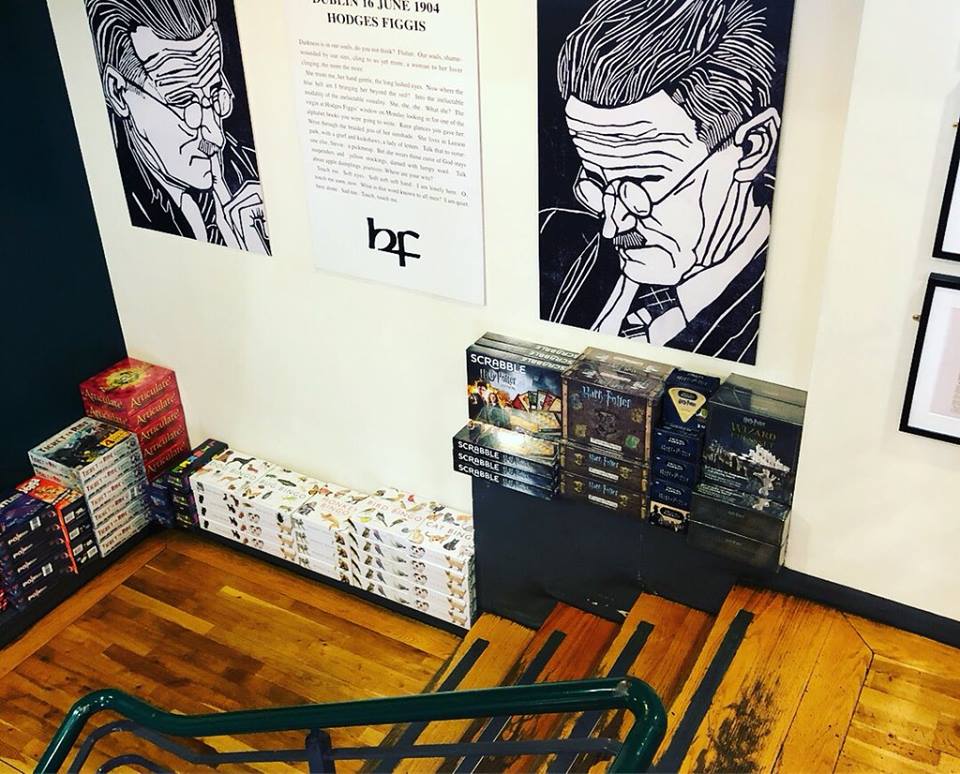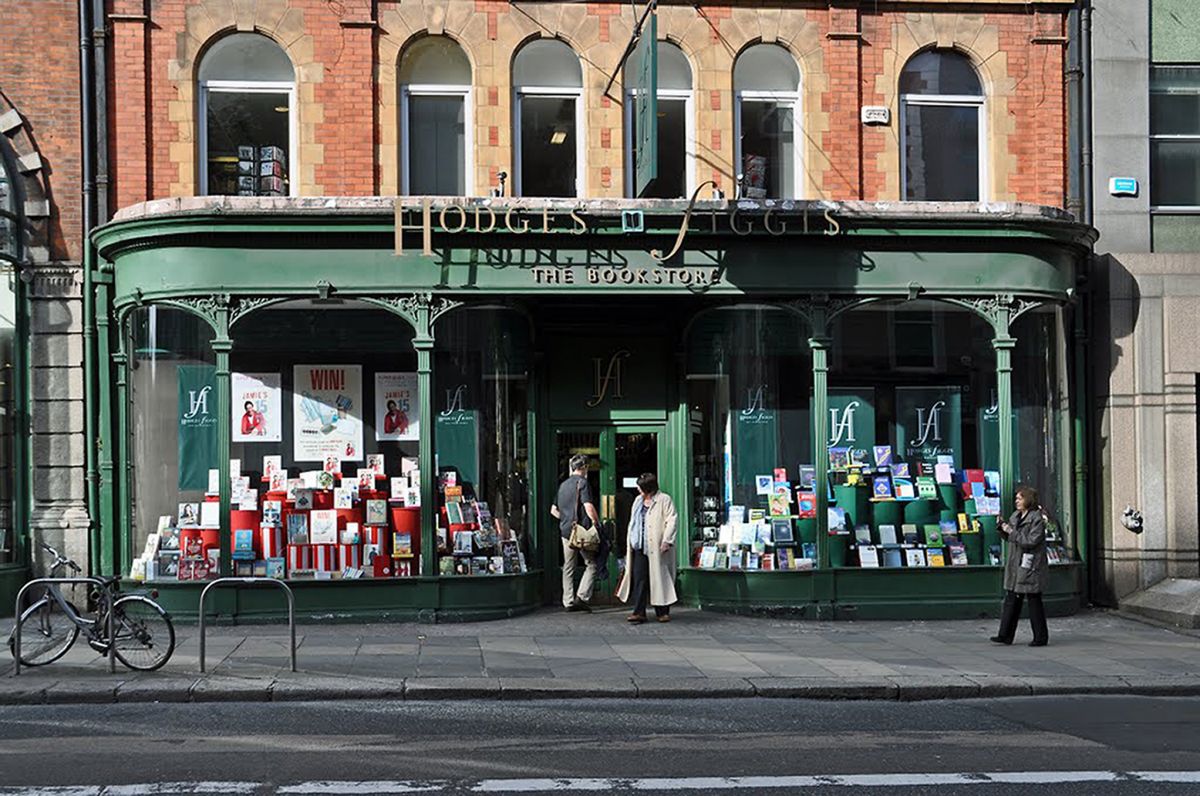You are viewing your 1 free article this month. Login to read more articles.
Retail Spotlight: Hodges Figgis
Stately, plump sales figures might best sum up Hodges Figgis in Dublin, arguably the most famous store in the Waterstones estate and one of the group’s top performers.
The shop’s oft-quoted mention in James Joyce’s Ulysses assures it of that status. The would-be writer and Joyce alter ego Stephen Dedalus is wondering to whom he might address his ardent words. “She, she, she. What she?” he asks, and answers: “The virgin at Hodges Figgis’ window on Monday looking in for one of the alphabet books you were going to write. Keen glance you gave her.”
True, it’s only a passing mention, but it’s enough to make the shop part of any literary pilgrimage to the city. Authors still continue to namecheck Hodges Figgis to this day: a whole chapter of Sally Rooney’s recent Conversations with Friends (Faber) takes place in the shop.
 Joyce is hugely important to the store, with a permanent wall of the author on the ground-floor (he would probably invent a word for this). Manager Gina O’Donnell, who has worked at the store since the early 1980s, says: “Our mention in Ulysses has been of significant assistance to our shop’s reputation worldwide. Our customer base is probably 85% local, and perhaps 15% tourists. We would be seen as a centre for Irish interest, and academic subjects with Trinity College close by, as well as the main seat of government, with whom we have close connections. Irish people have a great love of books—Dubliners and Irish people in general have remained extremely loyal to Hodges Figgis.”
Joyce is hugely important to the store, with a permanent wall of the author on the ground-floor (he would probably invent a word for this). Manager Gina O’Donnell, who has worked at the store since the early 1980s, says: “Our mention in Ulysses has been of significant assistance to our shop’s reputation worldwide. Our customer base is probably 85% local, and perhaps 15% tourists. We would be seen as a centre for Irish interest, and academic subjects with Trinity College close by, as well as the main seat of government, with whom we have close connections. Irish people have a great love of books—Dubliners and Irish people in general have remained extremely loyal to Hodges Figgis.”
This year the shop is celebrating its 250th anniversary—another reason for its fame within the Waterstones canon. It is by some distance the oldest store in the group, with 30 years on its nearest rival, Hatchard’s (Britain’s oldest continuously-run bookshop, which became part of HMV/Waterstones in 1995). The rest of the group are all comparative youngsters. When Joyce was born in 1882, Hodges Figgis was already an old shop.
It has marked the anniversary with an anthology of Irish writing, entitled Reading the Future, with 250 contributors.
It is published by Irish literary press Arlen House, with the €13.5m proceeds going to Hodges Figgis. The pieces of writing are interspersed with archival material relating to the history of the shop, and a copy was presented to Irish president Michael Higgins, whom O’Donnell says is “a lifelong supporter of Hodges Figgis”.
Hodge-podge
The famous shop was founded in 1768 by John Milliken, the son of a Dublin property-owner. It has occupied several locations in the city centre since that date; charting its various moves around central Dublin, its changes of ownership and expansions into neighbouring properties, is complicated. Suffice to say it began life at 10 Skinner’s Row (which becomes Skinner’s Alley in Finnegans Wake), spent a famous century in Grafton Street (where the Ulysses mention took place) and moved to its current home in Dawson Street in 1978.
During its time in Grafton Street, it ran into difficulties and in 1834 booksellers Hodges and Smith, from nearby College Green, took over the running of the shop. When Smith retired in 1892, Samuel Figgis, who already worked at the company, created a limited company—and the name Hodges Figgis was born. In the 1960s, the shop used the first word of Finnegans Wake to publish a series of out-of-print titles by Irish writers—50 years later, Jon Riley would use the same word for his Hachette imprint riverrun.
The Figgis family owned the store until 1978, when it was sold to Pentos, which also owned the Dillons chain. In 1995 EMI acquired Pentos, later merging with Waterstones as part of HMV. And in 2011, Waterstones’ previous owner Alexander Mamut bought the chain and Hodges Figgis from HMV.
One fan of the shop is none other than Waterstones m.d. James Daunt himself. “[Visiting] Hodges is always a treat,” he says. “[There is] the barest of nods in the direction of how it might, or might not, run things better, before discussion of books and other better things. The [staff] know, as I know, that I have nothing to teach them and really all they want is some money to invest in the old place. This, incidentally, will follow renewal of the lease, which happily is now all agreed.
“I have the greatest admiration for Hodges Figgis’ very distinct bookselling culture, so stoutly preserved throughout the HMV years. They have been very much an inspiration within the wider Waterstones business during my time, demonstrating how fierce, independent bookselling can be so powerful. It is a lesson from which the best of our Waterstones shops have greatly benefited, though with nothing resembling the Hodges Figgis spirit: this rests, inimitable, in the bookselling team on Dawson Street.”

An Irish Sea change
Hodges Figgis is one of three shops Waterstones has in Ireland (the others are Waterstones-branded stores in Drogheda and Cork), while there are five outlets in Northern Ireland. Those three shops in Ireland had revenue of just under €13.5m in the 52 weeks to 29th April 2017. That represented a drop in sales of €677,000 year on year, partially due to 2016 being a 53-week financial year. Despite the dip in sales, the after-tax profit rose a whopping 36% to €2.2m, which the chain said in its accounts was due to “continued operational efficiencies and margin improvements”. The chain employed 77 people (on average, per month) in Ireland in 2017, the same number of staff as the previous year. The Waterstones Ireland accounts do not strip out individual shops, but Hodges Figgis is by far the biggest store of the three and it can be assumed to have earned the lion’s share of revenue.
O’Donnell says Hodges Figgis feels very much like an independent and that it has “almost complete autonomy as regards layout and buying. Any company promotions or suggestions are just that—suggestions, which we can decide are a good fit or not for this shop.”
While some customers are aware of the connection between the store and Waterstones, she says this has never been a problem. “As long as we continue to run Hodges Figgis in the style to which the [customers] are accustomed, the ownership is not likely to be an issue. The James Daunt style of business suits us perfectly.”
Daunt is aware of the responsibility of overseeing such a prestigious name, and concludes: “I hope now that Waterstones is a worthy custodian for the shop. Certainly it feels confident and idiosyncratic, and in as good a shape as I have ever known it. A betting person, I like to think, may lay a decent wager on another 250 years of bookselling service to Dublin.”
This article featured in our Ireland Country Focus. For more content from this focus, click here.












